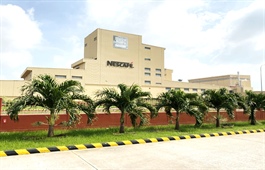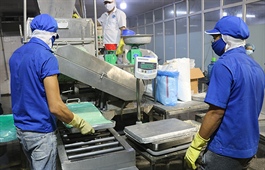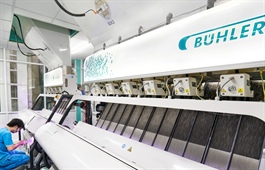Sustainability solutions at Vietnam’s production zones
Sustainability solutions at Vietnam’s production zones
Investment flows into industrial zones have been moving towards a smart model. Hong Sun, vice chairman of the Korea Chamber of Business in Vietnam, talked with Bich Thuy about sustainable investment trends in the field.
Industrial zones (IZs) and economic zones (EZs) have been hit hard by COVID-19. What solutions have they been implementing to mitigate the disruption of manufacturing, supply chains, and trade to support investment?
Nearly two years since the COVID-19 pandemic began, our daily lives have been seriously affected, and now we are entering the new normal – a time of living with COVID-19. Together with pandemic prevention and control measures, we need to ensure business and production activities to maximise efficiency and achieve the government’s double target.
IZs and EZs are home to many manufacturing factories. Many of them had to implement the “stay-at-work” operation model for extended durations under the pandemic, posing many difficulties for them. Therefore, urgent measures to deal with breaks in manufacturing, supply chains, and trade include the synchronous construction of IZ and EZ infrastructure to develop sustainably in the context of COVID-19.
Moreover, developers should consider supporting projects so that in case of an incident, IZs and EZs can ensure basic daily activities on their own and achieve autarky.
What new trends have you seen in Vietnam to promote sustainable development as land resources grow increasingly limited?
At present, there are a lot of IZ projects underway. However, I think that it is time for us to develop them in a new way, departing from the traditional methods we have been employing until now.
The majority of IZs now focus on the construction of energy- and water-efficient factories. However, we also need to change our approach towards building complexes of schools, housing areas for workers, and other necessary services at IZs and EZs. This would minimise the movement of labourers back to the countryside and problems in the implementation of “stay-at-work” policies.
It is high time for us to consider adopting smart IZ models and transform production and infrastructure accordingly.
The Vietnamese government is accelerating digital transformation as well as Industry 4.0. The country should take advantage of local resources and learn from the experiences of other countries, for example South Korea, to develop smart industrial park (IPs) models to fit the particular conditions and demands of each region.
Sustainability solutions at Vietnam’s production zones
What policies should Vietnam focus on to channel foreign investment, especially South Korean capital, into the development of smart IPs?
To attract foreign direct investment, the country needs to build long-term policies. Accordingly, the country needs developed infrastructure as well as a complete and consistent legal framework, and incentives for skilled workforce, along with simplified administrative procedures. Only when the country can create an ideal working environment and living place will it be able to attract foreign investors from all over the world, including powerful South Korean technology groups.























